The Most Dangerous Alliteration of All!
How I Saved My Job - and Likely Several Others - This Week with Just One PowerPoint Slide (That Wasn’t Shown)!

This article presents the story of and the lessons to be learned from how an innocent, well-meaning, yet unseen, alliteration on a student’s last presentation slide could have seen her expelled and cost not just me my job, but likely those of the higher ups at my university as well!

Introduction: Seeing Your Career Flash Before Your Eyes!
It’s not often that one sees your life flash before your eyes! People often speak of this phenomenon when they have a near-death experience or a very close call with the Grim Reaper. They report seeing their whole life in an instant, whether that moment comes laying in the Emergency Room, driving on an Interstate highway, or very firmly gripping the armrests (or the hand of a stranger on your right or your left) in seat 34B on a 737 in the midst of a violent thunderstorm!
Sometimes though, we can also have a moment where we see our careers seemingly flash before our eyes. We can have an instance where one encounter, one decision, one minute can make the difference between employment and unemployment, between being on a course for success and being terminated. And in the social media world in which we live today, where every student in a college, high school, or even middle school classroom basically has an HD camera in their pocket (or to be honest, in many cases, they are on their phones already during class), all of us in the “teaching business” are basically one slip, one misstep, one word, one poorly worded email, etc - be it intentional or completely unintentional - away from trending on TikTok, Instagram, Twitter, Snapchat, Facebook, etc. for all the wrong reasons!
And as we have seen in case after case after case from around the country, regardless of what level one is teaching at, your teaching career can be almost instantly ended with one comment that might be perceived - however rightly or wrongly - as being racist, sexist, homophobic, bigoted, or today, being on the wrong side of the political equation in your particular state, teachers, principals, and yes, some of my professorial colleagues can, often regardless of tenure protections (contrary to what many in the public may think) see not just their present jobs vanish. More importantly, as classroom incidents are no longer confined to the classroom, but end up being photographed and/or videoed and within just a matter of minutes, your name and your school instantly can easily become the top trending topics on social media.
This reality of life - and business today - often forces administrators to act more aggressively with their punishments than they might otherwise have done, absent the “Exhibits A, B, C…” that come from student pictures and/or videos of what was said, what was done, or what was shown in the classroom being on Twitter, Instagram, Snapchat, etc. And because social media is forever and because the very first thing any employer does today - whether through a simple Google search or through using one of the many paid services out there that will scrub the Internet for everything you have ever said, done, or in this case, seen you merely mentioned as an “accessory” on every social media platform - any such “incident” will follow you forever. And likely, the said incident will mean not just the end of your present job, but your teaching career as well!
Finally, if I haven’t scared you enough to run out of your classroom and switch professions immediately, sometimes, such incidents are not even caused by anything the teacher/instructor/professor might even say or do herself or himself, but by what students might say or do - and how you react - or fail to in that instant - "properly" react, according to what is a nebulous and ever-changing standard - no matter much or how little you may agree with the politics of American life today. This is true regardless of whether you are on the “Red Team'' or the “Blue Team”- or somewhere in the middle. And yes, the codes of conduct for classrooms - which is both written and unwritten in almost every educational setting today - and which is seemingly constantly changing and evolving - across secondary and postsecondary education today.
So, let me assure you that the story that I will share with you in this article does have a good ending! No one - including myself - got fired or even "called on the carpet," as the real incident never got the chance to happen - but only by a stroke of sheer luck! As a management professor with over 30 years of experience, who does try to inject humor, irreverence, and yes, fun, into his classes, I’d like to think that I can be as “edgy” with things as times. I also do encourage my students to be creative with their own presentations, and as one who makes use of peer reviews in grading students on their presentation performances, I constantly remind them that while substance is vitally important to delivering an effective presentation, creativity - and often humor - can make the difference between an ordinary, "run of the mill" presentation and one that stands out in the minds of the audience, and thus, will be highly rated, both by one’s classmates and yes, your instructor.
Just this week however, I averted an incident that likely would have not only “taken me out” of my tenured job, but that would have - more than likely - cost the student her academic career here and cost my dean - and maybe even the university president - their high-paying gigs if it had actually occurred in my classroom at the next class session! And it was only through sheer happenstance - a student approaching me to make sure that the graphics she was making use of in her PowerPoint slides for her upcoming presentation on the next class day didn’t “cross the line” - that I had the opportunity to see her final slide. That slide, which had no graphics, would have almost surely went viral all over social media and around the world, had it actually been shown in front of my class - with the fallout on myself, on university administrators, and on the student herself, who - I firmly and steadfastly believe had not realized the message that she had conveyed on the slide - but which, if presented in front of a diverse classroom, would have very rightly been perceived as “tone deaf” at best - and at least subtly racist at worst, and been an extreme, “career ending event” for all of us directly - and even indirectly - involved! In short, had this one slide been shown to a class of 40 people in late 2022, it would most assuredly have been photographed/videoed and would have then went viral on social media. And yes, the fate of myself, of higher ups, and yes, the student herself, would have been BAD - very baaaaaaaaaddd!
And so in this article, I will share what is both a cautionary tale and a tale of hope that happened to me as one who exists on the front-lines of American higher education today. Then, I will speak to what this one incident portends for how I - and I think you - should approach thinking about what we, ourselves as educators, not just say and do in the classroom, but how we should approach the very necessary, but today, very risky instances, when you turn your classroom over to one or more students delivering a presentation. All of this is done both to share my very near “career ending event”-experience with you and to speak to how you, as a fellow college professor or even a high school teacher today, can take steps to avoid the heart palpitations that I can tell you from this week’s experience are very real when one sees their career - and likely the careers of others - pass before their eyes!

The Student Presentation and the 3-word Alliteration That She Definitely Did Not See (and Luckily, Neither Did My Class)!
So, what exactly happened? Well, here’s the story. In my junior-level principles of management class, I have my students do what should be a simple, straightforward project for the semester. I ask them to take a concept - any concept - that they learned in this foundational, survey course on everything in management and simply apply it to something in their lives. Most choose to make the application to their work experiences (whether their present job or a former one), though some - especially those who are not working while going to school - choose to apply a management concept to their involvement with a social organization/group, to their family relationships, or in some cases, to themselves. I have had students over the years apply many different management, motivation, leadership, communication, business strategy, etc. concepts to their jobs or to another setting, producing what classes routinely rate as a very productive, very interesting exercise, both for the individual doing the application project and then, for the students who get to hear and learn from the experiences and the results that their peers found/produced - be they good, bad, or mixed - from the best possible source, their fellow students. In sum, it is - to borrow a waaaaay too overused expression - a “win-win” for all, as the presenting student learns from applying the management concept to their chosen situation and the rest of the class (who listen to these presentations) - hopefully, at least - learns from their experiences.
And so let’s get to the heart of the matter - the student presentation that is the subject of and reason for this article! At the end of my class a few short days ago, we had a bit of time remaining. as only 3 of the 4 students scheduled to make their presentations did so (and as hard as it is to say, 75% is not a bad rate these days!). As the class was breaking up and students were leaving a tad early, due to a missing 10-15 minute presentation, one student came forward to ask me a question. Now, this one particular student was a traditional female student (so, approximately 21 or 22 years of age), and yes, she was a white student (the demographic info will become much more relevant in a minute or two of reading) who had a simple request. She was scheduled to present during our next class meeting in two days, and she wanted to show me her slides. Now, this was indeed a rarity, as yes, in my experience, it is highly unusual for students to have their presentations actually done a few days, let alone a few hours, early! So, I was impressed already, as most students today employ a “just in time” approach to preparing their presentations!
Now, I was first flattered that the student was actually approaching me to review her slides well before her presentation date! She informed me - without my asking - that she indeed followed the project formula properly - applying a management concept (ethical decision making) to her present job as a part-time preschool teacher! She simply wanted to show me her presentation early because she had made use of a number of “funny” kid photos in her presentation. She was just concerned that this would not present any kind of problem from my perspective. As I was in the process of pulling up her presentation from her thumb drive, I just asked her if she thought there was anything in particular that she thought might be potentially objectionable in the photos, and secondly, if the pictures were of her actual students? She assured me that they were not her students, and that she was just a tad concerned about some of the "staging" with the photos. And once I did actually see her presentation, I could quickly confirm that all of this was indeed the case - and that the pictures were not a problem at all! In fact, her slides showed a high level of creativity - creativity that would portend that her presentation would be well-received by her classmates for their peer evaluation of her effort.
In actuality, the pictures she employed to accompany the text on her slides were of the type that you routinely see in memes on social media platforms - and might be seeing right now on another screen or in another tab! Indeed, this is her opening, title slide….
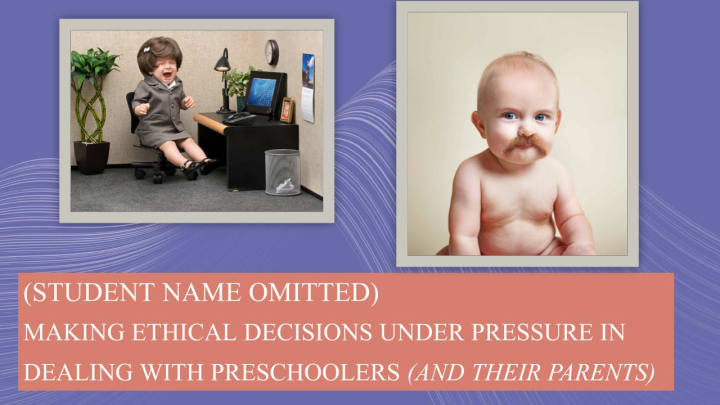
… and from there, she proceeded in applying what she had learned in the management course to her job as a preschool teacher… both in dealing with her very young students…
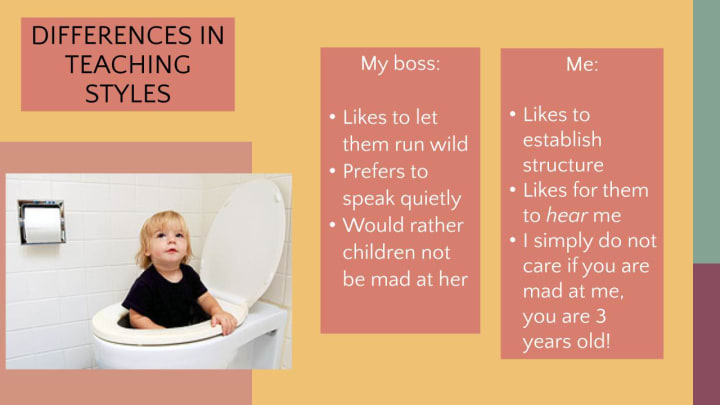
…. AND with their parents.
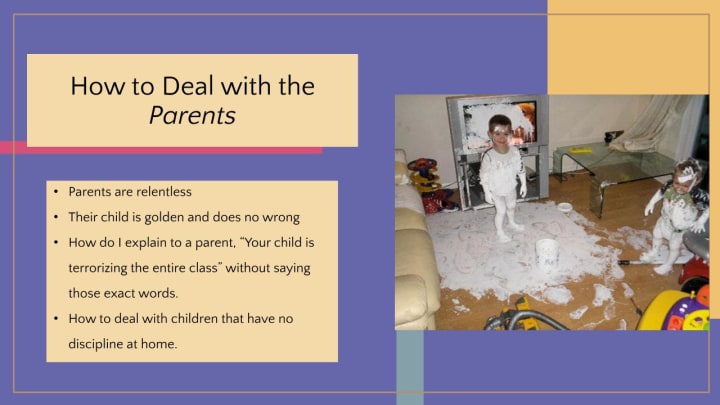
And then she concluded with this slide - which I almost didn’t even look at as I rather casually clicked through the remainder of her slides and saw how she had incorporated some really, really creative pictures into her presentation. But then I read the slide…
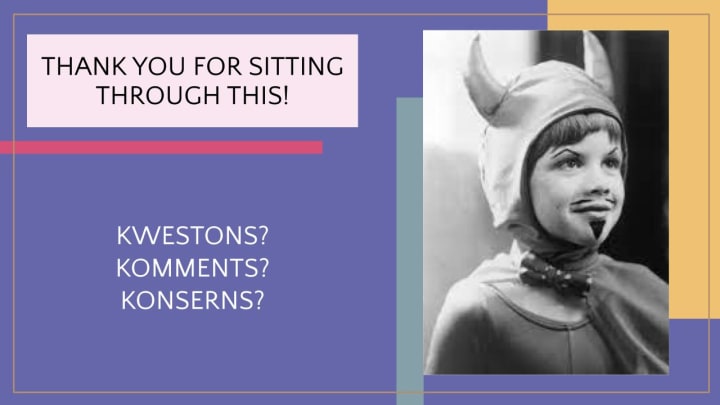
…and then I reread it, and then I reread it again!
I saw “something” right away (and more than likely, so did you just now!). In just a matter of seconds, my mind went from this being just a preview of what looked to be an “A” presentation that was to come in the next class to a “Houston, we have a problem!”-type, serious situation! My thoughts turned to how to ask her - delicately - about the something that I saw. I quickly ascertained what she was doing, trying to be creative in phonetically spelling out “Questions” as “Kwestons,” “Comments” as “Komments,” and finally, “Concerns” as “Konserns.” Now, how many of us haven’t concluded a presentation with a “throwaway” concluding slide with a simple “Thank You!” or some combination of “Questions,” “Comments,” and “Concerns.” She had tried to just “jazz it up, right?” - and no, I wasn't thinking about the boy in the devil costume!
I asked the student directly - well, as indirectly as my many years of experience and the many training/faculty development sessions (that I vehemently complained about to myself in those moments, but might have finally, actually paid off!) informed my nearing 60, white, male brain informed me to do so - if she, herself, saw any problem with this one particular slide. She said: “Why no. What’s wrong with it?” “Weeeeeellllll…,” I began somewhat cautiously saying, “Do you see any problem with the alliteration there?” Okay, so that was the wrong thing - or at least way - to pose the question, as she instantly had a kind of quizzical look come across her face. Now, with no disparagement intended here, but the word “alliteration” might have as well been some obscure, extremely long, National Spelling Bee-type word to her! So, I quickly retooled my query and said: “I know that you were trying to spell-out the words phonetically, which was a really nice, creative touch since your topic was teaching preschoolers. Buuuuuuuuuuutttt, do you see a problem with the three first letters of those words… if you just looked at the ‘K,’ the ‘K,’ and the ‘K’…” One word came from her mouth before I finished the third "K:" A very long “OOOOOOOOOHHHHHHHHHHHHH!” She suddenly realized both just what an alliteration was, and that she had made not just any alliteration, but the most dangerous alliteration! That was followed by an "OMG"- and no, not just the alliteration!
And do please note: If you are reading this from outside of America and/or maybe not all that familiar with U.S. history, please don’t Google “3-straight K’s!” Let’s just say you will get a mix of what happens when a baseball pitcher strikes out 3 straight batters and then, you will see a whole lot of history - and unfortunately some current info - on perhaps the most notorious group of racists that have operated in the United States since before the Civil War - a group that yes, is still out there today!
Well, she had a look of absolute shock on her face, and she quickly turned a little - well, a lot - more reddish in the face, almost matching the color of her sweater. And in that moment, I knew - with what I believe to be 99.5% confidence - that she had made a well-intentioned, innocent, and inadvertent mistake - but a mistake that had that slide been shown to the class… in academic terms, well, it could be - check that, very likely would have been - a potentially career-ending event for me, for her, and potentially, for those above me in the academic hierarchy here at my regional university that I teach at here in the Deep, Deep South! The colleagues with whom I shared the story over the next few days - and the slide - totally agreed with my assessment of the situation - and it’s potential to have highly catastrophic career consequences. I do have to say though that out of the half dozen folks that I shared the story with and showed the slide to, my direct boss (yes, we professors, contrary to what many in the public might believe, do have bosses!), my department head, was the slowest to see the troublesome alliteration with those first 3 consonants in the 3 words on her slide!
To a person, all of the colleagues with whom I discussed this scenario, foresaw what would have likely quickly happened in my classroom - and more importantly, beyond it - had she shown that one slide at the end of her presentation. Like I, they too agreed that they would have seen their careers flash before their eyes within just a few seconds of seeing that slide on the screen in front of any of their respective classes - and, like myself, be sooooooooo very relieved that the student had let them preview the presentation before the class got a chance to see it live!
What would the minutes, hours, and next few days have been like in the future that the “Ghost of Classes Future” in my own head - and in theirs - have been like had the slide actually made it to the screen? In one word: It would have almost assuredly been “tumultuous!” - or in simpler, less academic terms, “baaaaaaaddddd!” Everyone in my “circle of trust” agreed that in a class of almost 40 students, there very likely may not have been anything actually said out loud at the time during or even immediately after her presentation. My colleagues and my boss all agreed that it would be unlikely, even in the diverse classes we typically see at our university (and yes, this particular section was racially, ethnically, gender, and age diverse), no single student would have likely taken it upon themselves to stand-up and interrupt her presentation (or even ask in the Q&A that we have with the presenter after as part of the grading) and say something to the effect of: “Wait a gosh darn minute! Did you just try to send a message there?” On many other campuses in America today, a student showing this slide might have provoked an instant, intense “incident” with anger, shouting...and hopefully that would be all! However, this would have been an unlikely outcome at our place - after all, we in the South are known for our manners, even in 2022!
The real career and PR (public relations) danger, everyone to a person agreed, would have been what would have almost assuredly taken place on social media just after her presentation ended - with the devastating fallout from the inevitable action to come happening within just minutes - perhaps even before that day’s class would even even be over! My colleagues all thought that it would be very likely that 1, 2,...10 students among the almost 40 in the classroom for her presentation would have very likely taken their phones out of their pockets, purses, or backpacks - well, those that did not already - truth be told - already have their phones out during class, and capture that slide and that moment for perpetuity! Whether it would be a still photo or a video of that young woman presenting that particular slide with that particular “Triple K” alliteration, that image and/or that video - everyone agreed - when posted to social media, would have quickly gone viral! And yes, yours truly - and my university, and my dean, and quite probably even my university president, and certainly the student herself - all would instantly become trending topics across social media - and not for a good reason! As we all know, a social media firestorm - deserved or underserved - can spread very quickly these days, and in just a matter of hours - even within a few minutes, reputations, careers, and lives can be ruined!
All of the colleagues with whom I shared this story - and the slide - foresaw much the same negative fallout coming in the hours, days and weeks that would have followed the pics/videos inevitably hitting - and trending on - social media - and the future that the “Ghost of Classes Future” showed to me. The student would have been skewered online for creating and presenting the slide - regardless of what she had intended or not intended! I personally would have been skewered online for "allowing" her to present it - and for maybe not reacting “right” (whatever that might have been, according to the “wisdom of the crowd” online - yeah, that's an oxymoron these days if there ever was one!) - in that moment! The university - and the line of supervision above me - the department head, the dean, the provost, the university president - all would have been skewered online for fostering a culture and environment where such a thing could take place in the classroom!
And even if the online firestorm passed quickly (and in Internet days, we see stories like this flare up every day - really every hour - and then fade away, but never, ever disappear from the Web entirely), the “real world” fallout would have been - everyone agreed - in a word, severe! All around, reputations would be ruined and jobs likely (well, almost assuredly in the opinion of most of my colleagues) would be lost. And for all the hard work being done by dozens and dozens of colleagues across the institution and by our many students (in the classroom, in the community, and on athletic fields and courts), our regional university would, thanks to hashtags in the present and “Mr. Google” in the future, immediately and to some extent, forever, be linked to that series of 3 of the same consonants that constitutes the most dangerous alliteration - one that is especially troublesome for branding, for reputation, and yes, for recruiting, here in the Deep, Deep South!

Conclusion
So, in the end, what is my personal takeaway from all of this - and what do I think should yours be if you are a teacher, professor, university “umpty-ump” or educational administrator anywhere in America today reading this article about my recent "near career death" experience? What am I going to change about the way I do things, and what changes would I recommend that you do, after my brush with career and reputational extinction?
My answer might surprise you after reading this tale of just how close my student, myself, my bosses, and my university all came close - dangerously, dangerously close - to being where no man or woman wants to be today - the subjects of intense social media controversy and even anger (and perhaps, in the America in which we live in late 2022, yes, even worse!)! In short, I’m not going to change how I do things. Yes, I could require students to send me their PowerPoint slides at least 24 hours in advance of their presentations so that I could review them for anything - words, pictures, graphics, music, videos, etc. - that might in any way be seen as or even perceived as objectionable. That would perhaps be a prudent, wise policy to implement, especially considering that just a few short days ago, what was - admittedly - a cursory review of a student’s presentation slides very likely averted both a personal and institutional catastrophe. Yes, I could develop a multi-paragraph policy statement for my syllabi, trying to specify anything and everything that students absolutely cannot include in their presentation slides and/or say in their presentations. This would constitute a laundry-list of “thou shalt nots,” along with provisions on the harsh penalties (a failing grade and even possible referral to the university’s disciplinary process for “severe” violations) if you were to include/do/say one of the 17 prohibited “things” in your presentation.
And if I don’t take such precautionary steps individually and at my own discretion, knowing just a bit about how the “administrative brain” works after three decades spend teaching in the academy, I would wager that after reading this article, the higher ups at my institution - and maybe even yours - might convene some of those emergency 3 to 4-hour meetings (well, why not a whole "emergency executive retreat" at a beach resort this weekend if the weather’s good!) to develop an 8-page, highly detailed and filled with many bullet-lists policy on what specific things a student can and cannot say, include, depict, etc. in a classroom presentation and, of course, how that burden will now fall solely on the faculty member to personally review all presentations beforehand to ensure that no violation of this new policy could ever, ever, ever take place on our campus!
No, the bottom-line is that I am a management professor. And at the core of good management and leadership today - anywhere - and that does include the college classroom - is one key, foundational element, and that is trust. And here in late 2022, I think that whether one agrees with the way things are generally in society today, or alternatively, if one sees things as being either being waaaaaayy too “woke” or waaaaaayy too conservative, we basically all - every one of us - can still, hopefully at least, agree on one thing. This is the fact that regardless of our backgrounds, education, and yes, the amount and type of training that we might go through, repeatedly, on DEI (diversity, equity inclusion), on sexual harassment, and on more today, all of us have a basic knowledge of right and wrong, and yes, a decency and respect for others (even if sometimes we don’t see it or show it, especially when it comes to our politics today!).
And so in spite of what the lawyers, the consultants, or the state legislators might have to say about how things should be done - at least in theory - in the college classroom - or in reality, in any classroom today - you have to acknowledge two realities, whether you are coming at this as an educator or an administrator. First, you simply cannot - no matter how very, very hard you might try to do so, be able to develop a policy, a procedure, a guideline, a rule…let alone an actual law, to cover every possible thing that can occur, be said, be shown, etc. in a classroom - period, full stop! It is simply an impossible task, which, in reality, is an entirely unrealistic one in the first place - no matter how much time, how much effort, how much expertise, and yes, how many dollars you devote to try to develop the perfect text with just the right clauses to cover every possible situation.
And secondly, every group situation - which is what a collection of people in a classroom is at its essence - is - and always will be - unpredictable, no matter how structured and predictable one might try to make it from a training, documentation, and policy perspective. People will always be people, and when they mix together, there will always be variability in their interactions - and yes, mistakes will be made! And yet, everyone in the education equation must trust one another - administrators trusting teachers, teachers trusting students, and students trusting both the teacher in front of them and the administration that puts and keeps that person there - at least enough for the whole enterprise to “work!” In the end, we simply have to trust one another - and accept that mistakes will invariably happen - mistakes by students, by teachers, and by administrators alike - and just vow to learn from those missteps and to do better in the future. Otherwise, without that trust, the whole system will, ultimately, not be able to function!
And so that is why I believe this story is so important to get out there. Yes, I hope that my “near career death experience” might serve as a cautionary tale for all of us in the educational business today. But I also hope that it is a learning opportunity for everyone as well - and yes, that includes students! Check your content. Check your slides. And then check them again. And if you have any questions about whether you should or should not say something a certain way, use a particular photo or video, or do anything else that you are even a tad uncertain about whether or not it’s appropriate, do precisely what my young female student did in this instance and simply ask! Ask your professor directly. And do so beforehand! Literally a world of problems were avoided by her doing so for a number of people - not just herself and myself! And yes, I very much appreciated her doing so - and that I still have a job!
++++++++++++++++++++++++++++++++++++++++++++++++++++
About David Wyld
David Wyld is a Professor of Strategic Management at Southeastern Louisiana University in Hammond, Louisiana. He is a management consultant, researcher/writer, publisher, executive educator, and experienced expert witness. You can view all of his work at https://authory.com/DavidWyld.
Social Media Links to David Wyld:
About the Creator
David Wyld
Professor, Consultant, Doer. Founder/Publisher of The IDEA Publishing (http://www.theideapublishing.com/) & Modern Business Press (http://www.modernbusinesspress.com)
Reader insights
Nice work
Very well written. Keep up the good work!
Top insights
Heartfelt and relatable
The story invoked strong personal emotions
Eye opening
Niche topic & fresh perspectives
Easy to read and follow
Well-structured & engaging content
Excellent storytelling
Original narrative & well developed characters
Expert insights and opinions
Arguments were carefully researched and presented
On-point and relevant
Writing reflected the title & theme




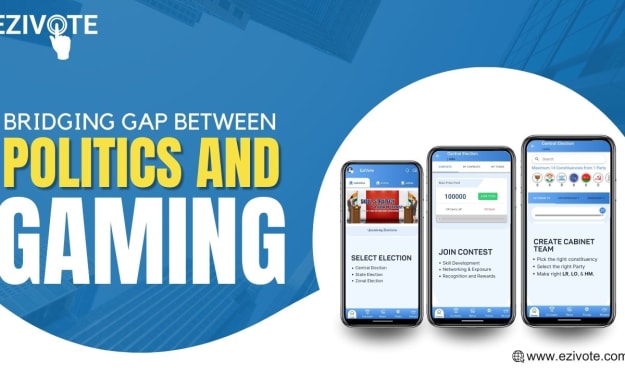


Comments (14)
Hi we are featuring your excellent Top Story in our Community Adventure Thread in The Vocal Social Society on Facebook and would love for you to join us there
Ah, Professor - I so like how you just put it out there to readers - I can relate in a different 'staccato' style - often I just rant; my fingers make me do it as evidence in my story 'Alter Ego.' I'm just an old short story teller; for the fun of it. But I just couldn't resist writing 'The Edge' I will be following you! Thanks for the smiles! Jay Kantor, Chatsworth, Cal 'Senior' Vocal Author
Hilarious! Well written, too!
All my professors all required this before presenting any kind of projects. Even if I am only a writer of educational materials one still must be careful in what one writes.
Excellent Keep up the good work
What a fantastic article! Thank you for sharing. I have been a college instructor since 1990, writing curriculum and teaching a variety of classes to a variety of students, and have come across many communication hiccups, mistakes, misunderstandings, and "potentially life-altering incidents". Fortunately, my "fun classes" escaped the social media tsunami that now happens, but what I have taken away from your experience is that trust IS crucial...and encouraging creativity with an eye/brain on re-reviewing your presentation/essay with objectivity and open-mindedness (as opposed to detailed, written "rules/restrictions") toward how others could view your material is critical. You sound like an awesome educator, and it gives me hope that you are encouraging others (managers, instructors, and students alike) to just pause and question with common sense, still knowing that sometimes honest mistakes will happen. Really great article.
Super wordy. Strong voice.
Resume is your academic profile and qualifications, the relevant industries you've worked in, the products and processes you've worked with that may cross over and the key job titles you have held. More CV template for <a href="https://cv.jobz.pk/">Click Here</a>
I teach at a college in Canada, and I once made the mistake of saying 'Ron Jeremy' instead of 'Ron Burgundy' when discussing film characters and the media. Your piece made me think that we all make mistakes and should accept that we are still human... And thank you for making me laugh on a long night of prepping for another class! ;)
It breaks my heart and I'm disgusted to no limit... that we've come to police words - our own and others' - in a university no less and by a teacher, for fear of mob retribution. Truly heartbreaking. Here's my alliteration for this generation: Like Lecherous Losers
Good luck publishing
Same thing happened to Krusty on The Simpsons...!
Me not being a teacher, I would never spotted those things!
Well, it’s good that was spotted!